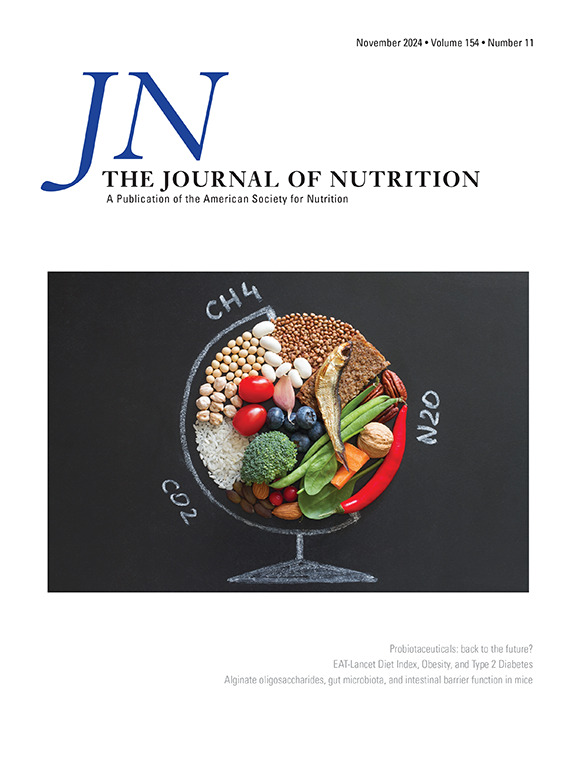Food Avoidance Taboos During Breastfeeding Are Widespread and Associated With Large Declines in Maternal Dietary Diversity in Myanmar
IF 3.7
3区 医学
Q2 NUTRITION & DIETETICS
引用次数: 0
Abstract
Background
Maternal food avoidance practices during pregnancy and breastfeeding have been documented in several Asian countries, but their prevalence and impacts on dietary diversity are not well quantified.
Objectives
This study: 1) assessed the prevalence of beliefs around maternal food avoidance during breastfeeding in Myanmar; 2) explored the correlates of women’s food avoidance beliefs as well as mother’s stated rationales for avoiding specific foods; and 3) assessed how minimum dietary diversity of women (MDD-W) pertaining to mothers changed from pregnancy to postpartum/breastfeeding.
Methods
We added a novel nutrition module to a nationally representative survey (N = 12,353) in Myanmar to estimate the prevalence of beliefs around maternal food avoidance during breastfeeding and resurveyed a subsample of mothers (N = 155) to understand avoidance of specific foods. We then used a high-frequency panel of mothers in Yangon (N = 3541) to assess how MDD-W changed from pregnancy to postpartum/breastfeeding, employing mother fixed-effects regressions.
Results
Forty percent of adult women in Myanmar believe that breastfeeding mothers should avoid at least one food group that nutritionists would typically define as a healthy (e.g., vegetables and fruits). Regression analysis indicated these beliefs were less prevalent among women with more education and nutritional knowledge and with exposure to nutrition counseling from community health workers. Mothers rationalized food avoidance by referring to a variety of perceived maternal and child health risks. MDD-W pertaining to mothers in the Yangon panel fell by 43 percentage points from pregnancy to the first month after birth, including significant declines in 8 of the 10 MDD-W food groups. MDD-W remained significantly lower ≤6 mo after birth than during pregnancy.
Conclusions
Food avoidance taboos during breastfeeding pose a potentially serious risk of micronutrient deficiencies for mothers and infants and warrant more extensive monitoring in nutrition surveys and more research on how to redress these nutritionally harmful beliefs and practices.
在缅甸,母乳喂养期间的食物避免禁忌很普遍,并与母亲饮食多样性的大幅下降有关。
背景:在一些亚洲国家,孕妇在怀孕和哺乳期间避免食物的做法已被记录在案,但其流行程度及其对饮食多样性的影响尚未得到很好的量化。目的:本研究:1)评估缅甸母乳喂养期间母亲食物避免观念的流行程度;2)探讨了女性食物避免信念与母亲陈述的避免特定食物的理由的相关性;3)评估与母亲有关的最低膳食多样性(MDD-W)从怀孕到产后/母乳喂养的变化情况。方法:我们在缅甸的一项具有全国代表性的调查(N = 12,353)中添加了一个新的营养模块,以估计母乳喂养期间母亲避免食物的信念的流行程度,并重新调查了母亲的子样本(N = 155),以了解对特定食物的避免。然后,我们使用仰光母亲的高频面板(N = 3541)来评估MDD-W从怀孕到产后/母乳喂养的变化,采用母亲固定效应回归。结果:缅甸40%的成年妇女认为,母乳喂养的母亲应避免至少一种营养学家通常定义为健康的食物(例如,蔬菜和水果)。回归分析表明,这些观念在受教育程度和营养知识程度较高以及从社区卫生工作者那里获得营养咨询的妇女中不那么普遍。母亲通过参考各种可感知的母亲和儿童健康风险来合理化食物避免。与仰光小组的母亲有关的MDD-W从怀孕到出生后第一个月下降了43个百分点,包括10个MDD-W食物组中的8个显著下降。出生后≤6个月的MDD-W仍明显低于妊娠期。结论:母乳喂养期间的食物禁忌对母亲和婴儿造成微量营养素缺乏的潜在严重风险,需要在营养调查中进行更广泛的监测,并对如何纠正这些营养有害的信念和做法进行更多的研究。
本文章由计算机程序翻译,如有差异,请以英文原文为准。
求助全文
约1分钟内获得全文
求助全文
来源期刊

Journal of Nutrition
医学-营养学
CiteScore
7.60
自引率
4.80%
发文量
260
审稿时长
39 days
期刊介绍:
The Journal of Nutrition (JN/J Nutr) publishes peer-reviewed original research papers covering all aspects of experimental nutrition in humans and other animal species; special articles such as reviews and biographies of prominent nutrition scientists; and issues, opinions, and commentaries on controversial issues in nutrition. Supplements are frequently published to provide extended discussion of topics of special interest.
 求助内容:
求助内容: 应助结果提醒方式:
应助结果提醒方式:


